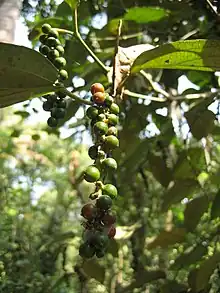piper
English

Etymology 1
From Middle English piper, pipere; equivalent to pipe + -er. Piecewise doublet of fifer.
Pronunciation
Noun
piper (plural pipers)
- A musician who plays a pipe.
- A bagpiper.
- 2020 May 20, “Railway remembers VE Day with a series of tributes”, in Rail, page 15:
- At Glasgow Central and Edinburgh Waverley, the sounding of train horns was followed by a lone piper playing When the Battle's Over.
- A baby pigeon.
- A common European gurnard (Trigla lyra), having a large head, with prominent nasal projection, and with large, sharp, opercular spines.
- A sea urchin (Cidaris cidaris) with very long spines, native to the American and European coasts.
- (slang, obsolete) A broken-winded hack horse.
Derived terms
Translations
|
Etymology 2
Anagrams
Aromanian
Alternative forms
- piperu, chiper
Etymology
From Greek πιπέρι (pipéri), from Ancient Greek πέπερι (péperi).
Derived terms
- mpipiredz
See also
- pipercã
- sari
French
Pronunciation
Audio (file)
Conjugation
| infinitive | simple | piper | |||||
|---|---|---|---|---|---|---|---|
| compound | avoir + past participle | ||||||
| present participle or gerund1 | simple | pipant /pi.pɑ̃/ | |||||
| compound | ayant + past participle | ||||||
| past participle | pipé /pi.pe/ | ||||||
| singular | plural | ||||||
| first | second | third | first | second | third | ||
| indicative | je (j’) | tu | il, elle, on | nous | vous | ils, elles | |
| (simple tenses) |
present | pipe /pip/ |
pipes /pip/ |
pipe /pip/ |
pipons /pi.pɔ̃/ |
pipez /pi.pe/ |
pipent /pip/ |
| imperfect | pipais /pi.pɛ/ |
pipais /pi.pɛ/ |
pipait /pi.pɛ/ |
pipions /pi.pjɔ̃/ |
pipiez /pi.pje/ |
pipaient /pi.pɛ/ | |
| past historic2 | pipai /pi.pe/ |
pipas /pi.pa/ |
pipa /pi.pa/ |
pipâmes /pi.pam/ |
pipâtes /pi.pat/ |
pipèrent /pi.pɛʁ/ | |
| future | piperai /pi.pʁe/ |
piperas /pi.pʁa/ |
pipera /pi.pʁa/ |
piperons /pi.pʁɔ̃/ |
piperez /pi.pʁe/ |
piperont /pi.pʁɔ̃/ | |
| conditional | piperais /pi.pʁɛ/ |
piperais /pi.pʁɛ/ |
piperait /pi.pʁɛ/ |
piperions /pi.pə.ʁjɔ̃/ |
piperiez /pi.pə.ʁje/ |
piperaient /pi.pʁɛ/ | |
| (compound tenses) |
present perfect | present indicative of avoir + past participle | |||||
| pluperfect | imperfect indicative of avoir + past participle | ||||||
| past anterior2 | past historic of avoir + past participle | ||||||
| future perfect | future of avoir + past participle | ||||||
| conditional perfect | conditional of avoir + past participle | ||||||
| subjunctive | que je (j’) | que tu | qu’il, qu’elle | que nous | que vous | qu’ils, qu’elles | |
| (simple tenses) |
present | pipe /pip/ |
pipes /pip/ |
pipe /pip/ |
pipions /pi.pjɔ̃/ |
pipiez /pi.pje/ |
pipent /pip/ |
| imperfect2 | pipasse /pi.pas/ |
pipasses /pi.pas/ |
pipât /pi.pa/ |
pipassions /pi.pa.sjɔ̃/ |
pipassiez /pi.pa.sje/ |
pipassent /pi.pas/ | |
| (compound tenses) |
past | present subjunctive of avoir + past participle | |||||
| pluperfect2 | imperfect subjunctive of avoir + past participle | ||||||
| imperative | – | – | – | ||||
| simple | — | pipe /pip/ |
— | pipons /pi.pɔ̃/ |
pipez /pi.pe/ |
— | |
| compound | — | simple imperative of avoir + past participle | — | simple imperative of avoir + past participle | simple imperative of avoir + past participle | — | |
| 1 The French gerund is usable only with the preposition en. | |||||||
2 In less formal writing or speech, these tenses may be found to have been replaced in the following way:
(Christopher Kendris [1995], Master the Basics: French, pp. 77, 78, 79, 81). | |||||||
Derived terms
References
- “piper”, in Trésor de la langue française informatisé [Digitized Treasury of the French Language], 2012.
Latin

Etymology
Borrowed from Ancient Greek πέπερι (péperi, “pepper”), via Middle Persian from an Indo-Aryan source, ultimately from Sanskrit पिप्पलि (pippali, “long pepper”), itself of unknown origin (perhaps a Dravidian or other substrate language of the Indian subcontinent). The declension was changed to a rhotic-stem.
Pronunciation
- (Classical) IPA(key): /ˈpi.per/, [ˈpɪpɛr]
- (modern Italianate Ecclesiastical) IPA(key): /ˈpi.per/, [ˈpiːper]
Noun
piper n (genitive piperis); third declension
- pepper
- compiled by 5th century CE, Apicius, De Re Coquinaria 4.12:
- ...Et, cum siccaverint, super aspargis piper tritum et inferes. Ad mensam nemo agnoscet quid manducet.
- ...And, when they get dry, sprinkle mashed pepper on them, and serve. At the table, no one will know what they're eating.
- ...Et, cum siccaverint, super aspargis piper tritum et inferes. Ad mensam nemo agnoscet quid manducet.
Declension
Third-declension noun (neuter, imparisyllabic non-i-stem).
| Case | Singular | Plural |
|---|---|---|
| Nominative | piper | pipera |
| Genitive | piperis | piperum |
| Dative | piperī | piperibus |
| Accusative | piper | pipera |
| Ablative | pipere | piperibus |
| Vocative | piper | pipera |
Derived terms
- piperātārius
- piperātōrium
- piperātum
- piperātus
- piperita
- piperō (“bell pepper”)
- Italian: peperone
- Emilian: puvron, pevron, pivron
- Ligurian: pevión, povrón, peverón, peveión
- Lombard: peveron, pieron, povron
- Piedmontese: povron, puvron, pevron, pouron
- → Vivaro-Alpine: povron, puvron (Valadas)
- Romagnol: pevaron, piviron, povaron
- Franco-Provençal: pêvron, povrun, peivron, póuron
- French: poivron
- Occitan: pebron (also pebròt, peberòt, cf. Catalan pebrot)
Related terms
- piperītis
Descendants
- Dalmatian:
- Italo-Romance:
- Padanian:
- Emilian: péivar, pévar, peuvre
- Friulian: pevar
- Ladin: peiver
- Ligurian: pèivie, pèivre, pèive, pêve
- Lombard: pever, pévar, péer, pìer, per, péivar
- Alpine: péuro
- Ossolano: péuro, pòvar
- Piedmontese: péiver, paivre, péure, paire, pèvre, pèive, pèivre, pòiver
- Romagnol: pévre, pévar, péivar, puéivar
- Romansch: paiver, peiver, pever
- Venetian: pévaro, pévar, pévare
- → Italian: pevere
- → Mòcheno: pever
- Northern Gallo-Romance:
- Southern Gallo-Romance:
- Insular Romance
- Sardinian: pibere, pibiri, pipere
- → Basque: piperra
- → Proto-West Germanic: *pipar (see there for further descendants)
- → Middle Irish: pipur (see there for further descendants)
- → Proto-Slavic: *pьpьrь (see there for further descendants)
- → Translingual: Piper
- → Welsh: pupur
References
- “piper”, in Charlton T. Lewis and Charles Short (1879) A Latin Dictionary, Oxford: Clarendon Press
- “piper”, in Charlton T. Lewis (1891) An Elementary Latin Dictionary, New York: Harper & Brothers
- piper in Gaffiot, Félix (1934) Dictionnaire illustré latin-français, Hachette.
- “piper”, in Harry Thurston Peck, editor (1898), Harper's Dictionary of Classical Antiquities, New York: Harper & Brothers
- “piper”, in William Smith et al., editor (1890), A Dictionary of Greek and Roman Antiquities, London: William Wayte. G. E. Marindin
Middle English
Etymology 1
From Old English pīpere; equivalent to pipe + -er; compare Old Norse pípari and Old High German pfīfari.
Pronunciation
- IPA(key): /ˈpiːpər(ə)/
References
- “peper, n.”, in MED Online, Ann Arbor, Mich.: University of Michigan, 2007, retrieved 2022-01-04.
Norman
Norwegian Bokmål
Norwegian Nynorsk
Romanian

Etymology
Borrowed from Bulgarian пипе́р (pipér), from Proto-Slavic *pьpьrь, from Latin piper, from Ancient Greek πέπερι (péperi), from Sanskrit पिप्पलि (pippali).
Pronunciation
Audio (file)
Declension
See also
West Frisian
Etymology
From Old Frisian piper, from Proto-West Germanic *pipar.
Further reading
- “piper”, in Wurdboek fan de Fryske taal (in Dutch), 2011